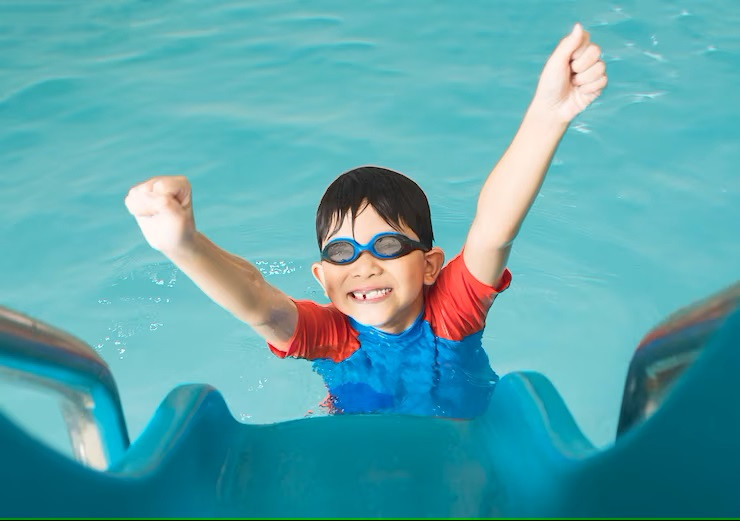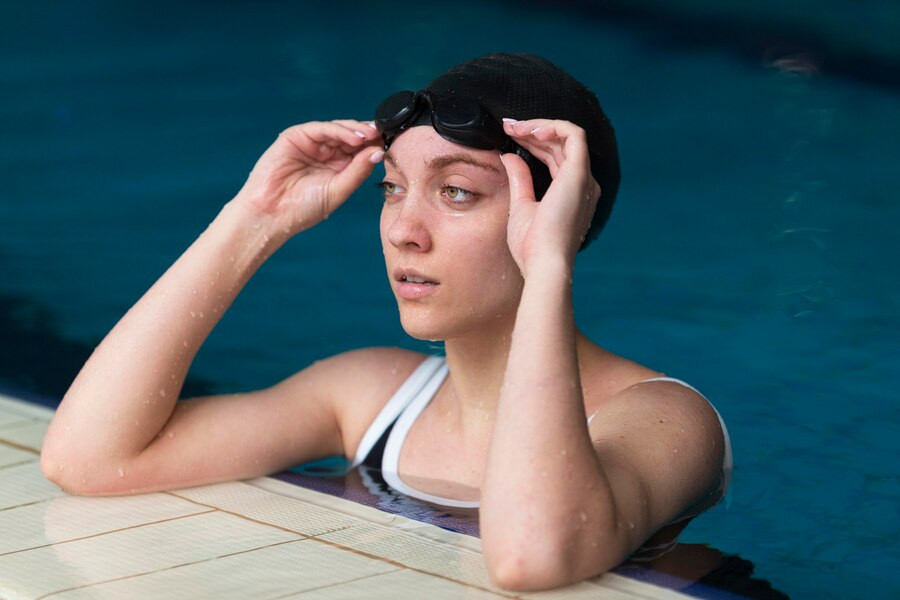Mengajari anak berenang menjadi sesuatu yang perlu dipertimbangkan karena memiliki manfaat yang signifikan. Berenang merupakan keterampilan yang penting dan bentuk olahraga yang menyenangkan serta sehat.
Manfaat Berenang bagi Anak-Anak
Berenang memberikan banyak manfaat khususnya bagi kesehatan anak-anak, di antaranya:
Melatih tubuh secara keseluruhan
Aktivitas berenang melibatkan hampir seluruh otot di dalam tubuh. Gerakan mengayuh saat berenang melibatkan otot-otot punggung, lengan dan tangan, kaki, perut dan punggung bawah serta otot inti tubuh.
Melalui latihan yang teratur anak akan mengembangkan kekuatan dan kelenturan di seluruh tubuh serta membantu meningkatkan postur tubuh, kebugaran fisik, dan kekuatan umum. Selain itu, berenang mengembangkan keterampilan motorik serta koordinasi tubuh anak secara keseluruhan.
Berenang membantu meningkatkan keamanan anak di air
Salah satu manfaat utama berenang adalah bahwa anak Anda akan belajar cara berenang dengan benar. Ini akan memberi mereka keterampilan dasar untuk mengatasi situasi darurat di air dan membantu mereka tetap aman.
Anak dapat belajar teknik dasar seperti mengapung, menendang kaki, dan menggerakkan lengan, yang kesemuanya adalah keterampilan penting untuk berenang dengan aman.
Berenang meningkatkan kepercayaan diri anak
Melalui latihan berenang yang teratur, kepercayaan diri anak di dalam air akan meningkat. Anak akan merasa lebih nyaman dan percaya diri dalam menghadapi tantangan dan situasi baru di air. Kepercayaan diri yang kuat ini dapat membantu mereka tetap tenang dan mengambil tindakan yang tepat dalam situasi darurat.
Baca Juga: Apa Saja Manfaat Berenang bagi Perkembangan Bayi?
Meningkatkan kualitas tidur anak
Berenang adalah bentuk latihan aerobik menyeluruh dan dapat membantu meningkatkan kondisi kesehatan anak secara keseluruhan. Latihan teratur melalui berenang dapat membantu meningkatkan sirkulasi darah, mengoptimalkan fungsi organ tubuh, dan meningkatkan kualitas tidur anak sebagai hasilnya.
Berenang baik bagi penderita asma
Berenang dalam kolam renang yang bersih dan terpelihara dapat mengurangi paparan terhadap alergen udara seperti serbuk sari, debu, dan alergen yang sering memicu serangan asma. Berenang melibatkan latihan aerobik yang dapat membantu meningkatkan kapasitas paru-paru, memperkuat otot pernapasan, dan meningkatkan fungsi kardiovaskular.
Pada akhirnya, berenang membantu meningkatkan daya tahan dan mengurangi sesak napas yang terkait dengan kondisi asma anak.
Baca Juga: Tips Berenang yang Aman Bila Menderita Asma
Kapan Anak Boleh Mulai Belajar Berenang?
Menjelang usia 4 tahun anak sudah siap untuk belajar berenang. Di usia ini anak sudah dapat mempelajari keterampilan dasar bertahan hidup di air seperti mengapung, menginjak air dan berusaha keluar dari air.
Penting untuk memastikan bahwa anak mendapatkan pelatihan berenang dari instruktur yang berkualitas dan dalam lingkungan yang aman. Pastikan untuk mempertimbangkan kemampuan, kenyamanan, dan minat anak serta prioritaskan keselamatan di sekitar air.
Manfaatkan layanan konsultasi dengan dokter melalui aplikasi Ai Care yang bisa diunduh di PlayStore atau AppStore jika ingin mendapatkan pertimbangan keamanan berenang sesuai kondisi anak.
Mau tahu informasi seputar kehamilan, menyusui, kesehatan wanita dan anak-anak? Cek di sini, ya!
- dr. Monica Salim
Ashley Marcin (2017). What Are the Top 12 Benefits of Swimming?. Available from: https://www.healthline.com/health/benefits-of-swimming
Healthy Children (2023). Swim Lessons: When to Start & What Parents Should Know. Available from: https://www.healthychildren.org/English/safety-prevention/at-play/Pages/Swim-Lessons.aspx
Kids Health (2022). Water Safety. Available from: https://kidshealth.org/en/parents/water-safety.html
Swimming.org (2023). Help your child develop water confidence. Available from: https://www.swimming.org/learntoswim/children-water-confidence/
Swimming.org (2023). Asthma and swimming. Available from: https://www.swimming.org/justswim/asthma-and-swimming/











